Judith Jackson-Pomeroy's Blog
March 22, 2025
WEIGHT OF WOMAN
February 22, 2025
Who's Afraid of Gender?
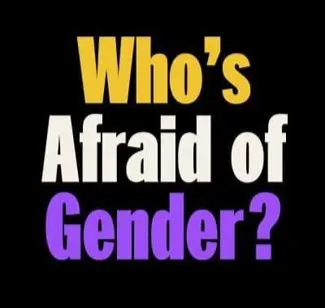
Judith Butler, author of Who's Afraid of Gender? warns us (again, as in her book Gender Trouble) about gender as malleable, fickle, inauthentic, something learned through repeated performance and rewards (for the performance) in social interaction. In this new book, Butler's thesis is a cautionary tale about the "Gender Ideology" movement sweeping the globe, and with which "47" -- We don't use his name -- swooped into a second term. You know the one, the ideology that says gender and sex are symbiotically tied and real, when in fact they are both social constructs. In essence, Butler's thesis warns us that the buck does not stop with "gender." And that's what we're witnessing: A full-blown attack on DEI, a backlash against the Civil Rights Movement, a white supremacy (which is wrapped unequivocally in misogyny). "Gender ideology" is a cancer that has now spread into anti DEI, a "moralizing sadism," as Butler calls it. #Resist.
February 19, 2025
debut novel: WEIGHT OF A WOMAN
January 21, 2025
Release Date....Release Date....Release Date
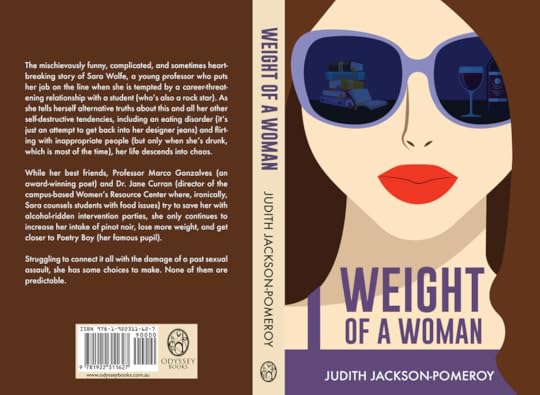

April 30, 2022
Read my Interview with Ashley Hasty, author of Hasty Book List

I'm so grateful to Ashley Hasty for the fun interview, which is now featured at her website, Hasty Book List, and on Twitter.
Please check out my interview and Ashley's wonderful (book lovers) website!
Book review blogger extraordinaire, you can also find Ashley at The Best of Women's Fiction podcast, with Lainey Cameron, author of The Exit Strategy.
April 10, 2022
Writings on Oppression & Violence

The worldwide response to the war waged on Ukraine speaks to the human impulse to empathize with people who struggle just to survive. In the West, our outrage and horror at what is happening in Ukraine is a response reflecting that the struggle to survive war and violence is a long-ago worry for us, although we should remember that for many people in the West, surviving (violence) is an ongoing daily experience; I'm thinking here of domestic violence, race violence perpetrated by the criminal justice system, sexual violence, etc. Is it any wonder that writers living in such spaces create work that fictionalizes their experience? For novelists and poets, writing about violence and war is a way to transform or understand it, to shine a white-hot light on your oppressor(s) and what it’s like to live daily with total fear that you and your children (and other people you love) might not make it through the day, or because you have no other story to tell.
Many Ukrainian authors write about the history of their country (especially the perennial threats and realities of annexation from Russia, totalitarianism, and countless wars), and the unique human qualities that evolve from such a narrative. There are some masterpieces to read. But don’t take my word for it; check them out, talk about their work, share these books (with friends and family). We all feel so angry and helpless but immersing ourselves in the stories of everyday life in Ukraine (falling in love, family sagas, friendships, laughing and crying, and death) is one (small) way to support the Ukrainian people.
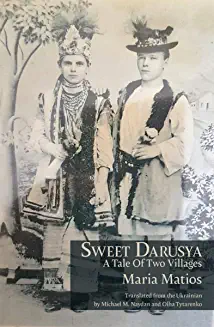
Heralded as a leading Ukrainian author and war diarist, Maria Matios is one such author who has mastered the art of the novel. Her book, Sweet Darusya: A Tale of Two Villages (2003, transl. 2019), is a rural-village based family saga told in reverse order, starting in the 1960’s and ending in the 1940’s. Darusya, who doesn’t speak and suffers with blinding headaches, is considered a “simpleton” (albeit a dearly loved one) in the village where her family have lived for generations. The villagers ponder why Darusya has “lost her wits,” wondering whether it is “the hand of God” or childhood trauma. As the novel traces the family back through the 1950’s, then to Darusya’s childhood in the 1940’s, her silence is unpacked. Situated against the backdrop of the partisan fight (i.e., Romania, Germany, Russia) for control of Ukraine, we learn that Darusya's silence and head pain begin on the day the enemy burst into the family home demanding supplies. At its heart, this novel is a story about the impact of war on Ukraine and what the Ukrainian people are fighting for at this very moment.
You can buy this novel online (and support independent bookstores), or find your local independent bookstore here.

March 20, 2022
Support Ukrainian Writers
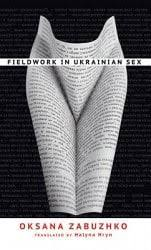
One way to support Ukraine is to buy the books of (risk-taking) Ukrainian writers. I've been immersing myself in the work of Ukrainian women writers and will dedicate the February and March blogposts to featuring those artists and their stories. My aim is to feature one new writer (and my favorite of their novels) every other week.
Please find your own Ukrainian writers to support, follow them, review their books at Goodreads, Bookbub, or wherever else you talk about books, and tell your friends and family about their books. Please, please, please let me know who I might be missing (on this list) or who I haven't discovered yet.
Oksana Zabuzhko grew up in Ukraine under Soviet occupation, and her work focuses on issues of national identity and gender. Her first novel, Fieldwork in Ukrainian Sex (1996), left me wondering how I'd lived this long without reading Sabuzhko. Sadly, not many of her books have been translated into English, but you can find this book and her second, The Museum of Abandoned Secrets (2009) at your local independent bookstore. Google 'Indie bookstores near me,' and ask them to special order either of these books. If you live in the outer-Hebrides, or some other such place a million miles from an independent bookstore, then click here for an alternative socially-conscious book-buying experience.
Fieldwork in Ukrainian Sex is Zabuzhko's semi-autobiographical novel, and it sent shock waves around Eastern Europe for its open expression of dissatisfaction with daily life and gendered experience. It's an out-and-out attack on an oppressive culture that controls women both socially (through totalitarianism) and sexually (i.e., through patriarchy).

I admire Fieldwork not just for its confrontation of hegemonic gender norms and attack
on totalitarianism, but also for its style, which is itself a push-back. If, like me, you're not a literary theorist, don't be put off or intimidated by the Ecriture Feminine writing style, rather, see it as part of Zabuzhko's protest against life in Ukraine as a female living with occupation. Ectirure Feminine, first introduced by Helen Cixous, is a uniquely feminine writing style, which is the result of the suppression of the female voice and being forced to write in a "borrowed language;" the language of men.
Zabuzhko's second novel, Museum of Abandoned Secrets, is especially timely, as it deals with Ukraine's resistance to (Soviet) colonialism in the 20th century. It's interesting, and deeply sad, to position this story (which unpacks the myth of friendly nations that Putin tried to perpetuate in the early 2000's) against the current war.
Spread the word about Oksana Zabushko!

Stay tuned to this blog for more reviews of books from risk-taking, brave Ukrainian writers.
December 28, 2021
Weight of a Woman Cover Reveal
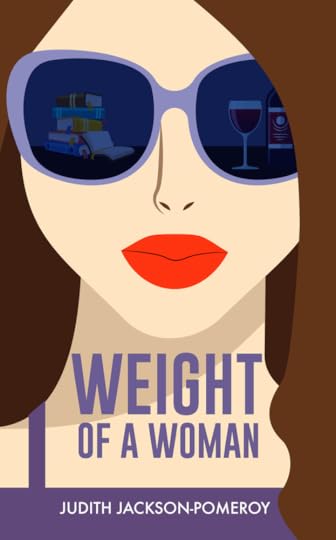
The cover choices are here for my forthcoming book, Weight of a Woman, set for release in 2024. My favorite is the featured image for the post, but I'm happy to be convinced otherwise, so please peruse the 3 options below, then please let me know what you think. I'd love to hear your opinion!
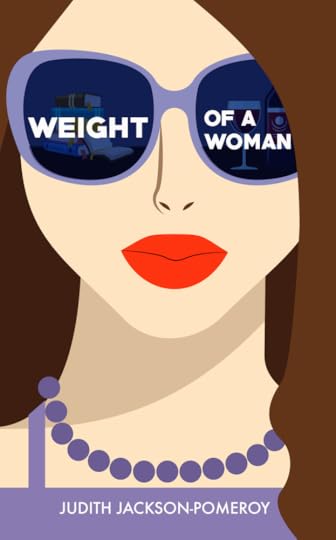


Please let me know your thoughts. Thank you.
And, before I go, let me wish everyone a Happy New Year. May 2024 be good and kind.
December 5, 2021
What do Babies, Dogs, and Chicks Have in Common?
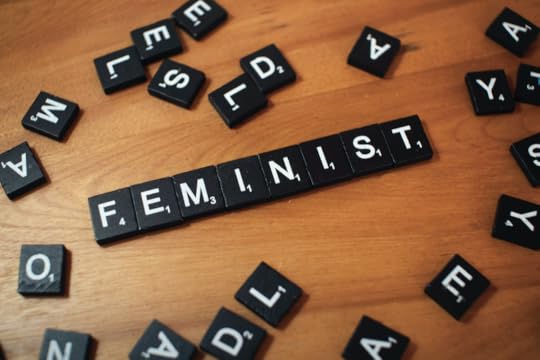
My debut novel, Weight of A Woman, was initially titled Feminist Guru, but then a friend in publishing said to me, “really? The F word? Well, that’s going to turn people off right away.”
Words are more powerful than we think. Sticks and stones may break my bones, but names will never hurt me is a big lie. Sticks and stones may very well break your bones, but bones heal, while the names they call you will fester in your mind until they cement themselves in every cell of your body, leading to ill (mental and physical) health.
In his article, “Pricks” and “Chicks”: A Plea for Persons, the philosopher Robert Baker tells us just how much words matter in shaping our lives and affecting our very health. Chick, Dog, Baby, among so many other colloquial terms used to describe women (as sexual objects), have connotations, right? A chick is a tiny, helpless bird, while a dog is a domesticated animal trained to be obedient, and a baby a dependent, tender, fragile being. Since the way we talk about things affects the way we think about and, ultimately, act towards those things, words matter; a lot. While Baker’s article focuses on the long-term effects of these words on women, we could (and should) extend this to people of color, LBGTQ+, immigrants, and other marginalized communities.
Marginalized groups’ lives are more heavily shaped (and controlled) by words than they are for White people, straight people, or men. For example, the word “cracker” (used to describe White people) is meant to be derogatory, but in a world where White people, straight people, male people are more likely to be in positions of power (and control), those words just don’t carry the same weight, or have the same impact as they do on marginalized communities. Social Media, for all the damage it has wrought (much of it on White teenage girls), has served as a salve for the marginalized, providing a forum to come together and/or voice (experiences) when there is no other outlet. #MeToo, #BlackLivesMatter, #ICantBreathe #Queer, #MuslimGirl #ICantKeepQuiet #QueerBook.
When my friend the publisher said to me, “If you want people to read your story, give it a name that won’t connote a loathsome image,” I got the point. I know that during the great plague of Covid, a blog on the power of the word might seem a tad trivial. Words. Who cares? Well, we should care, because if we forget that words matter while we’re busy trying to survive Covid, then we might save lives at the expense of our humanity. We can save both. Step out in kindness, friends.
November 13, 2021
How Men Have Sex

In order to reach their audience about (the problem) with how sex gets defined for young, straight men, masculinities scholars, like John Stoltenberg, Michael Kimmel, and others, have settled on a down-to-earth, colloquial approach:
Men define sex as a dick in a pussy
Not only do they capture the attention of their audience with this language, but they contribute to 1. our understanding about how and why sex has become defined so narrowly for men, and 2. The consequences of being attached to such a rigid (pun intended) definition of sex.
Bear with me while I break it down.
The How and Why
The straight porn industry has shaped men’s idea of what sex is, according to Stoltenberg. That industry is a business, of course, and in order to survive they need paying customers. In a culture that pushes the lie that men are more interested in sex than women because of their hormones, men are their market. I know we could get into the argument here about hormones, but let’s put that argument on hold for another day. Meanwhile, since both men and women believe (the lie) that hormones ‘made me do it,’ men are the porn industries natural audience. Cue the men.
The straight porn industry defines sex for men as “penetration.” Stoltenberg uses much fresher, provocative terms than this to describe it, like ‘dick in a pussy,’ ‘blowjobs,’ etc., but his point is the porn industry is responsible for defining 1. what sex is for men, and 2. shaping their sexual desires and expectations. In other words, men’s sexual desires are not authentic, or their own (actual) desires, but coopted and realized, courtesy of the porn industry.
The Consequences of Being Rigid
Stoltenberg’s big concern with this coopting of men’s sexual desire by the porn industry knows no bounds. Let me break it down for you, guys. Here are just a few of the consequences:
The Porn Industry is Ruining Your Sex Life: In interviewing young men about their sex lives, Stoltenberg finds that most report being disappointed in their sex lives because the experience doesn’t fit the images and videos they’ve viewed in porn. In other words, they enjoy porn more than actual sex. Deb Tolman, the gender scholar, points to the ‘performance’ emphasis in porn as the reason men might feel disappointed with actual sex (with real women). Women in porn, after all, are performing rather than experiencing sex. That is, the scene is manufactured to a high degree, from hair and makeup, to lingerie, and facial expression and body position precisely posed. Actual sex doesn't look anything like that because real women are not likely to ‘perform’ the part perfectly, and so men are inevitably disappointed in the experience, and thus might prefer porn to actual sex.
Sexual violence: Since the porn industry presents women as performers for men’s pleasure, then it’s not such a leap to see how control and desire might become conflated. Stoltenberg’s further concern is that this conflating of control with desire is a contributor to sexual aggression against women. In other words, he believes the porn industry contributes to a culture that promotes sexual aggression (towards women) as ‘hot.’
Authentic Sex: When sex gets defined by an industry, shaping men’s desires and expectations about what pleasure is, the sexual experience becomes inauthentic. It's not your desire, it's theirs.
Stoltenberg implores men to consider how the porn industry is ruining their sex lives and encourages them to think about what they might be missing out on. He especially emphasizes that, if men learn to connect with their sexual partner(s) as people who are having an experience and not performing for someone else’s pleasure, sex will get a whole lot better.



